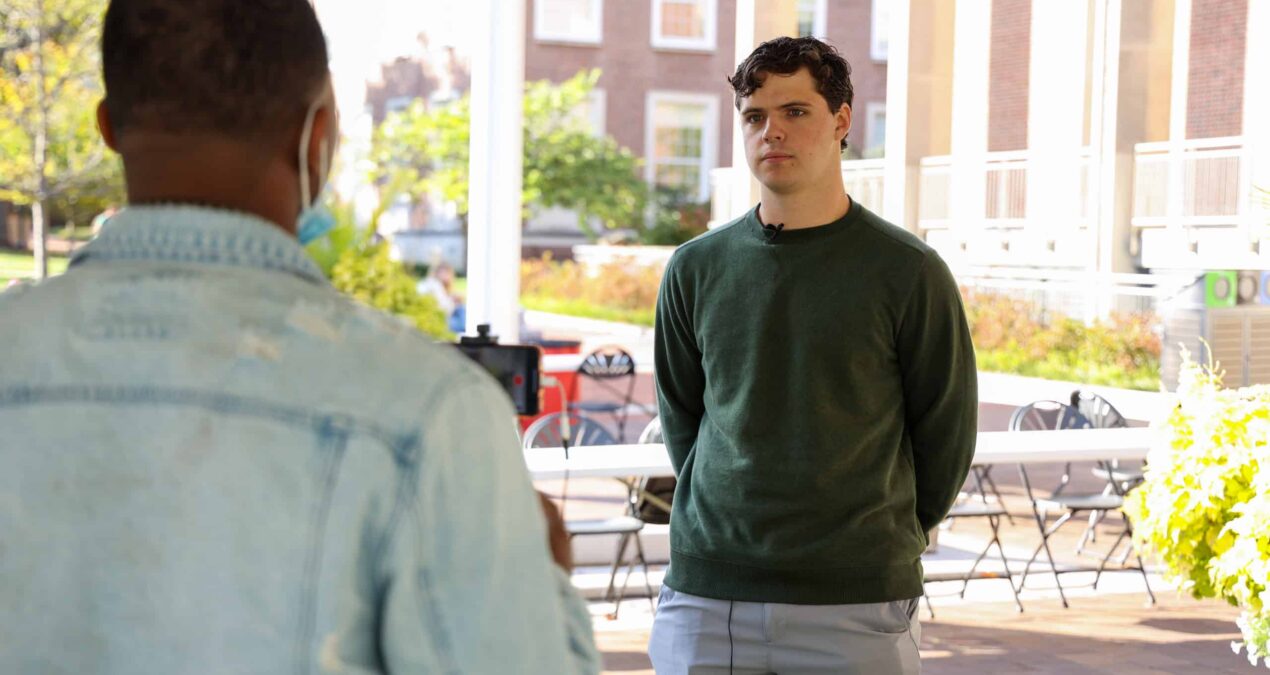RAY WALKER & AARON SKUBBY, Broadcast Producer & Editor-in-Chief—
“Growing.” “Work-in-progress.” “Cliquey.” “Disconnected.” “Disrespectful.”
These are the words that four students across Denison’s Greek life councils (and one administrator) used to describe Greek life at Denison. Despite the difference in word choice, all five agreed on one thing: there is a disconnect between Greek organizations and councils.
The four Greek councils on Denison’s campus are the Interfraternity Council (IFC), the Panhellenic Council (Panhellenic), the National Pan-Hellenic Council (NPHC), and the Multicultural Greek Council (MGC).
“NPHC and MGC have great relationships, but when it comes to IFC and Panhel the word that I would use would be ‘disrespectful,’” Chelsey Sarante ‘22 said. Sarante is a member of Lambda Theta Alpha Latin Sorority, Inc., a MGC sorority.
The NPHC is composed of historically Black fraternities and sororities, and the Multicultural Greek Council is made up of multicultural Greek-letter organizations. IFC represents predominantly white fraternities, and Panhellenic represents predominantly white sororities.
One-third of the Denison student body is affiliated with a fraternity or sorority, a number that will climb even higher in the spring semester when IFC and Panhellenic bring in new member classes. There is a serious size discrepancy between different councils. Some Panhellenic sororities have upwards of 80 members, while the entire NPHC currently has 9 members.
A lack of communication and collaboration was a theme recognized by all four students who spoke to The Denisonian. “As a community as a whole we tend to be pretty cliquey. People are afraid to get out of their comfort zone in regards to relationships,” Henry Burnett ‘22 said. Burnett is currently president of IFC fraternity Phi Kappa Psi.
A challenge students highlighted is that IFC and Panhellenic are both struggling with turning conversations to action. Panhellenic Council president Lily Morrow ‘22 highlighted some of the challenges she has seen. “There are definitely conversations with my peers and I do hear them, but it’s a matter of making them productive,” she said. “I’m tired of being stagnant.”
“I think that Panhellenic and IFC are really trying to make strides in reducing race’s effect on the segregation between councils,” Morrow said. As an example, she mentioned that Panhellenic had eliminated favoring legacy students for sorority recruitment.
Burnett felt a similar challenge within IFC. “People expect something to happen without coming together to make a change,” he said. “Even if we do put on events we need people to come and represent and help deconstruct barriers that are currently present within organizations and councils.”
Though Morrow and Burnett expressed optimism about change being possible, Sarante and Jaleel Poole ‘22 emphasized a lack of willingness to learn from members of IFC and Panhellenic organizations. Poole is part of Alpha Phi Alpha Fraternity, Inc., a NPHC fraternity.
“These conversations are very on the surface and that’s where it ends,” Sarante said. “It does come off to me as very performative. There’s no action behind those words.”
Poole said that IFC and Panhellenic organizations have done little to build connections with NPHC organizations. “They don’t respect us and they also don’t try to learn. There has been no drive or willingness to reach out to ask questions,” he said.
“We take up space in the Greek community much differently than they do because we come from a history of oppression and having to make our own organizations because of the exclusion and discrimination that we face from white organizations,” Poole said.
Dana Pursley, director of the Alford Community Leadership and Involvement Center, also highlighted the role that historic racism in Greek life plays in this disconnect. “Do our organizations understand that our historically white groups were meant to be isolating?” she asked.
Poole believes that a lack of intersectionality is a key problem in Greek life. “I think there’s a lack of recognizing, respecting, and addressing intersectionality and how people’s identities; their race, socioeconomic status, and sexual identity; can compound and make identities more complex,” he said.
Both Sarante and Poole mentioned that they are open to collaborating with IFC and Panhellenic organizations. “Members of NPHC and MGC have expressed on various occasions that we would love for them to be there, but even then there are times that people who identify as white feel nervous about going to those events,” Sarante said.
“We would love to collab,” Poole said. “We’re not against learning more about their community, but we also want the energy and willingness to learn to be reciprocal. We don’t want to establish a collaboration and most of the work falls on us.”
For members of the IFC and Panhellenic community looking to make change, it is important to self-educate and reach out. Sarante highlighted the simplicity of simply searching online to learn more about MGC and NPHC organizations.
Poole encourages members of IFC and Panhellenic to take action. “For us to always have to reach out to them is not fair, and because the systemic forces that have kept us oppressed and keep us oppressed work in their favor, it is not fair to us to have to do all the grunt work and reach out to you,” he said.

